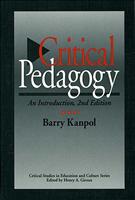
In my journey to deepen my understanding of Critical Pedagogy I have read the book Critical Pedagogy by Barry Kanpol. An excellent book with many on the ground examples of Critical Pedagogy implemented. When it comes to the development of critical technology I believe the following references really stand-out from this book; This first quote provides a description of the role of the teacher as critical pedagogue.
...then critical of the multiple forms of teaching methodologies; and the reproduction of values that oppress, alienate, and subordinate people (especially, for our concerns, students and teachers as related to race, class and gender configurations). Within this reskilling mode, critical pedagogy teachers challenge stereotyping, find ways to subvert tracking through alternative teaching methodologies, build curriculum with open and critical spirits, become involved in the policy-oriented decisions of the state and local school district, and form group solidarity over issues of value-laden importance.This second quote provides a description of the dialectic of the Me and the I with how a child exists within their community. This section of the book was powerful for it referes to the work of Herbert Mead.
Within this personal dialectic, the critical pedagogy self seeks to understand the self construction in an ongoing dialectic with oppressive social structures. How I, me and other can work dialectically both to oppress and emancipate us becomes of increasing importance to critical pedagogists.Kanpol continues with a description of a classroom environment where a teacher has a special ability to teach about differences and build upon these lessons with empathy for these differences. The book progresses through a number of schools and Kanpols descriptions of the teachers within these schools. Kanpol focuses his observations on teachers who, at differing levels, are critical pedagogists. Closer to the end of the book I find the third quote where Kanpol formalizes his description of the teacher as critical pedagogist;
Critical pedagogy is about teachers struggling for some semblance of control in their lives - control that has to do with achieving a qualitatively better life for students and teachers; control that has to do with finding a democratic path that begins to alleviate forms of oppression, alienation, and subordination.What is most important from this book is how Kanpols' writings fit within what I am calling Critical Technology. Its about the balance of challenging the existing structures of oppression, alienation, and subordination with teaching to the required curriculum. This also fits within the work of Friere where action should occur within the existing structures or the history and politics of the structures. There are two final quotes that I would like as the spirit of Critical Technology;
But the kind of criticality you will find in critical pedagogy is really different from this in that it's really about what I call critical consciousness. It is about focusing our critical capacities, our questioning capacity, on the everyday world in which we find ourselves with a purpose. And that purpose is rooted in a moral vision. It has to do with looking at the world, questioning the world as to whether, in fact, it treats people with dignity and respect; whether the world is one in which certain groups of people or individuals are limited or dominated, or whether the world that we live in, in fact, lives up to its democratic and humanistic promises.
Part of creating a critical pedagogy in teacher education is to move beyond mere cyitique or cynicism to a position where action can occur, where students can joyfully respond to structural constraints in a timely manner and in ways that create opportunities for democratic hope and critical citizenry.